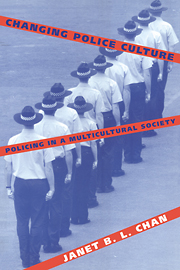Book contents
- Frontmatter
- Contents
- List of Figures
- List of Tables
- Acknowledgements
- Abbreviations
- Introduction
- 1 Policing in a Multicultural Society
- 2 Discrimination and Police Work
- 3 Strategies for Change
- 4 Re-examining Police Culture
- 5 Police and Minorities in New South Wales
- 6 Under New Management
- 7 Ethnic Affairs Policy Statement: The Paper Chase
- 8 Cop It Sweet: Reform by Media
- 9 Processes and Outcomes of Change
- 10 Changing Police Culture
- Bibliography of Works Cited
- Index
7 - Ethnic Affairs Policy Statement: The Paper Chase
Published online by Cambridge University Press: 04 November 2009
- Frontmatter
- Contents
- List of Figures
- List of Tables
- Acknowledgements
- Abbreviations
- Introduction
- 1 Policing in a Multicultural Society
- 2 Discrimination and Police Work
- 3 Strategies for Change
- 4 Re-examining Police Culture
- 5 Police and Minorities in New South Wales
- 6 Under New Management
- 7 Ethnic Affairs Policy Statement: The Paper Chase
- 8 Cop It Sweet: Reform by Media
- 9 Processes and Outcomes of Change
- 10 Changing Police Culture
- Bibliography of Works Cited
- Index
Summary
In response to rapid demographic changes in the population brought about by immigration, Australian governments at both federal and State levels have introduced mechanisms to ensure that government services are accessible and non-discriminatory. At the federal level, the principle of access and equity was translated into a strategy in 1985. The strategy aims to overcome ‘barriers of language, culture, race and religion which impede the delivery of government services to all residents’ (Office of Multicultural Affairs 1992: 1). In New South Wales, a similar program had already been introduced in 1983. The Ethnic Affairs Policy Statement (EAPS) required public sector service agencies to ‘develop structured plans for reform, with the aim of making their operations more responsive to the needs of a culturally diverse society’ (NSWEAC 1990: 6). The way the NSW Police Service responded to the EAPS requirement is the subject of this chapter. It is a case study that shows not only why policy fails, but also how the police organisation resists change imposed from outside.
Formulation
Requirement
In 1977 the New South Wales government established the first Ethnic Affairs Commission in Australia. The commission was initially formed to conduct an inquiry into the needs of the ethnic communities in New South Wales. It was established as a permanent government authority in 1979. Its objectives are:
to encourage full participation of persons comprising ethnic groups in the community in the social, economic and cultural life of the community;
to promote the unity of all ethnic groups in the community as a single society consistently with the recognition of their different cultural identities; and
[…]
- Type
- Chapter
- Information
- Changing Police CulturePolicing in a Multicultural Society, pp. 156 - 168Publisher: Cambridge University PressPrint publication year: 1997



